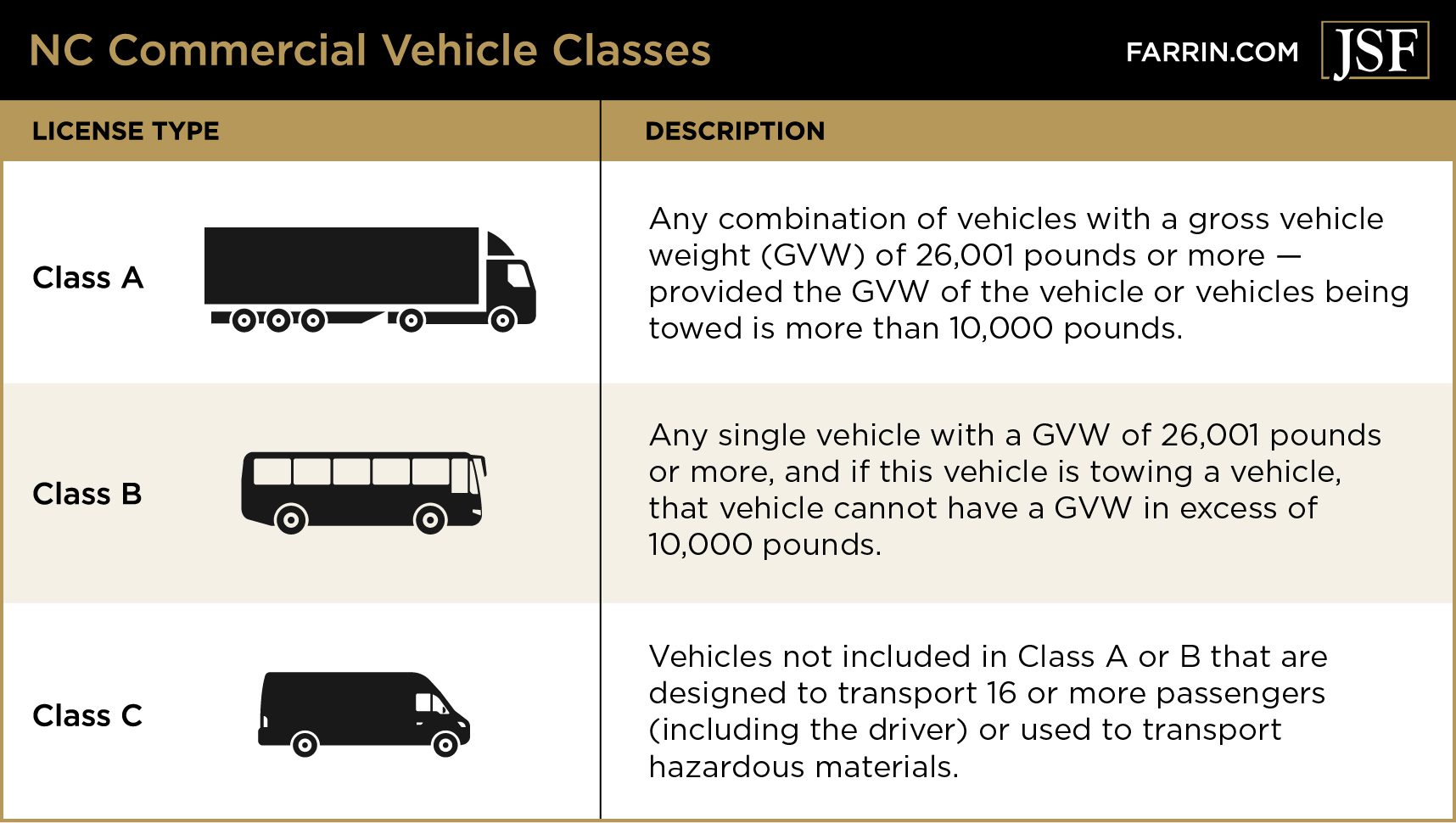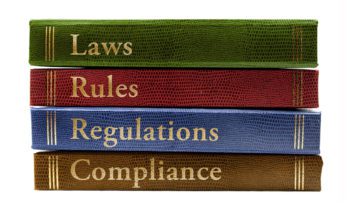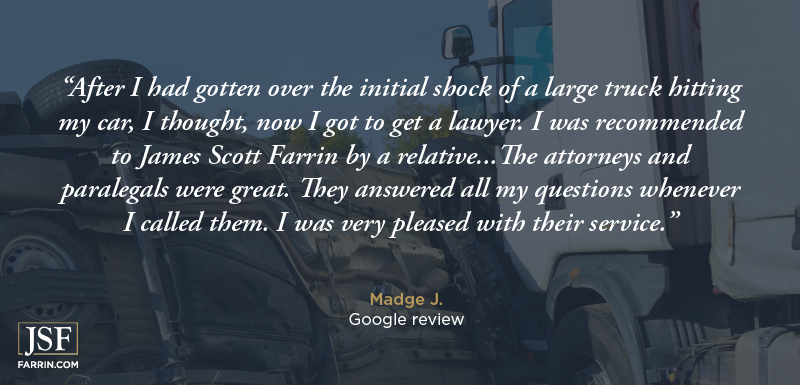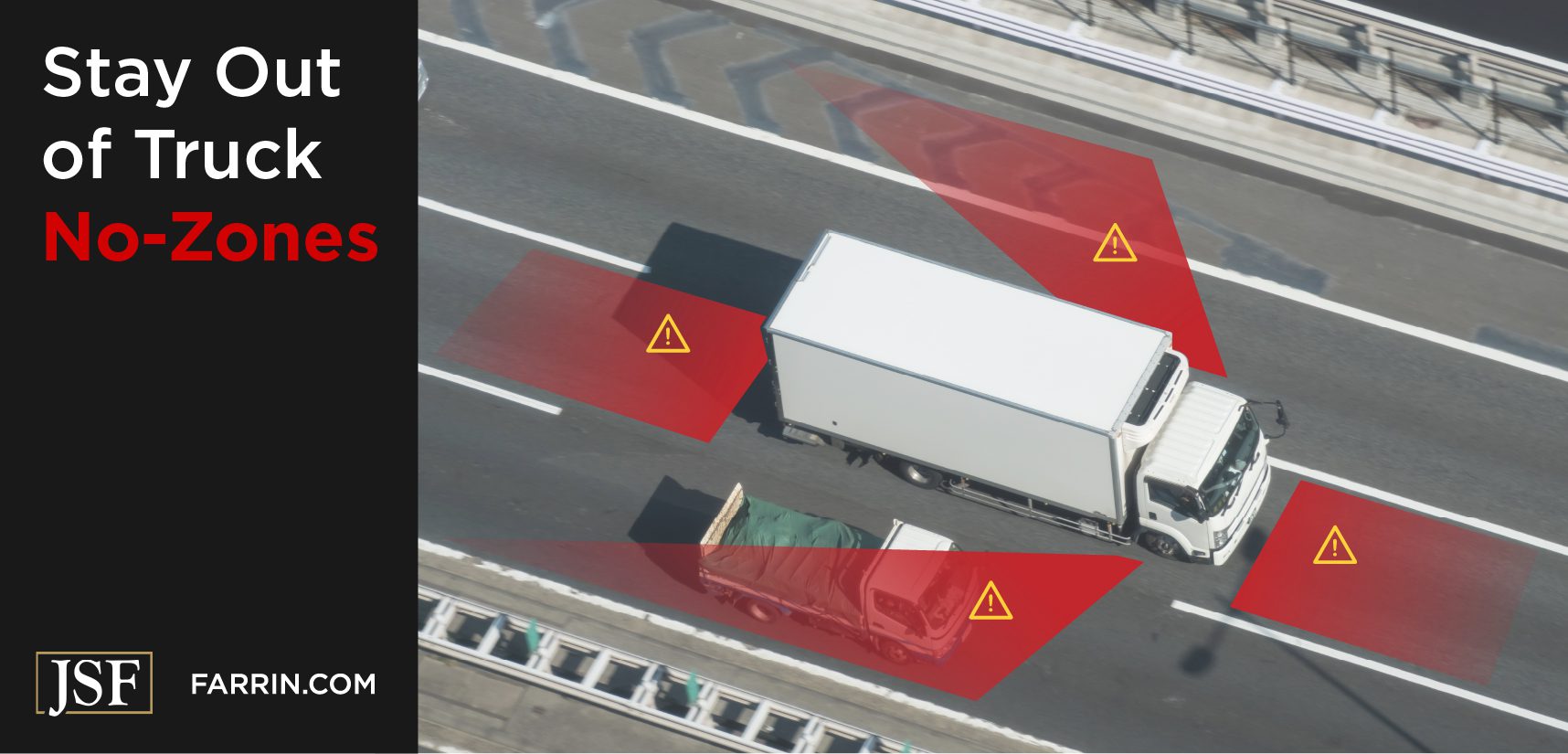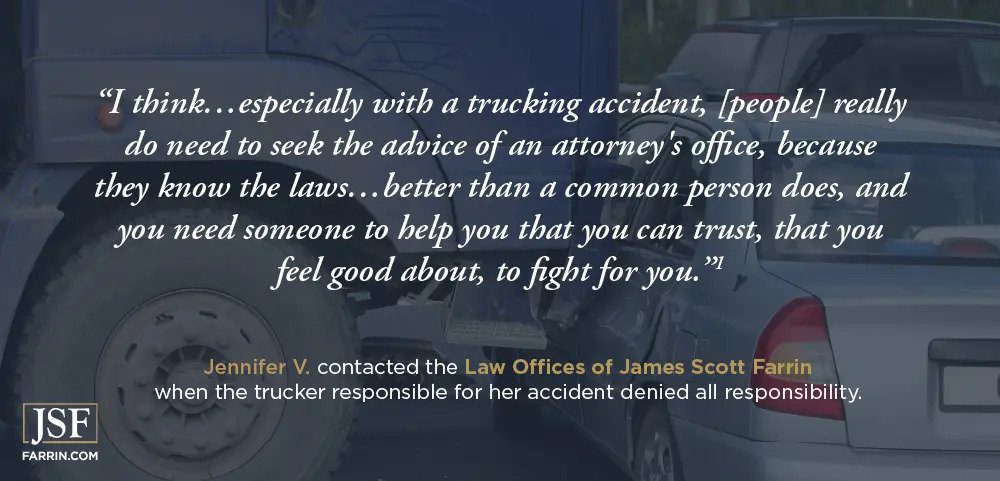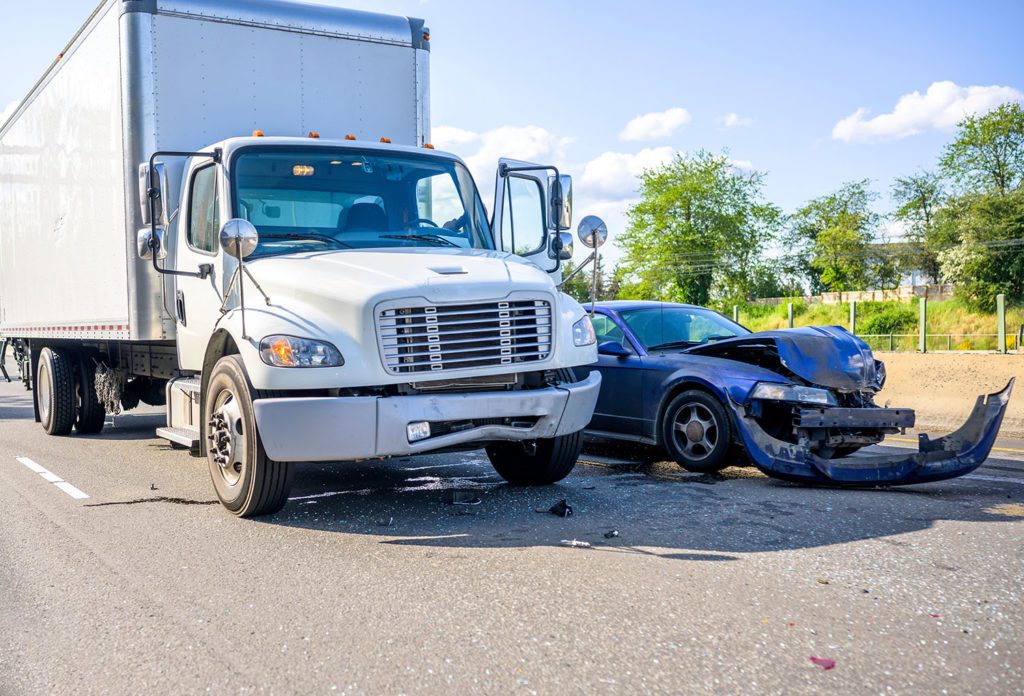
Injured in an accident with a big rig on North Carolina’s roads?
Truckers have more rules than regular vehicles. What does that mean for you?

This page refers to Truck Accidents law in North Carolina.
Since laws differ between states, if you are located in South Carolina, please click here.
How to Survive the Aftermath of a North Carolina Truck Accident
- What Do I Do if I Have Been in a Trucking Accident in North Carolina?
- What Qualifies as a “Commercial Truck” in North Carolina?
- What Are the Insurance Requirements for Commercial Trucks in North Carolina?
- How Are Trucks Regulated in North Carolina?
- Who Can Be Held Liable in a Truck Accident in North Carolina?
- What Are Common Causes of Trucking Accidents in North Carolina
- How Can a North Carolina Truck Accident Lawyer Help Me?
- How Do I Contact the Law Offices of James Scott Farrin?
What Do I Do if I Have Been in a Trucking Accident in North Carolina?
First things first, take a deep breath because you may be lucky just to be alive. Trucks are built to carry cargo so they are substantially larger and heavier than cars – some trucks actually carry a dozen cars! A legally operating 18-wheeler can weigh as much as 80,000 pounds or 40 tons – as compared to the average car which weighs in at less than 3,000 pounds. That puts you at a significant disadvantage when you get in an accident with a truck.
Next, you need to document every detail of the accident – this includes collecting police reports, accident photos, witness statements – anything and everything that could help prove that the truck driver was at fault.
Then you should contact an experienced truck accident lawyer as soon as possible after the collision. The company that owns the truck has probably already alerted its insurance claims adjusters, accident investigators, and defense lawyers because one of its main priorities is limiting exposure to civil liability. Truck wrecks are not just big car wrecks – they are complex and often involve multiple parties. It’s time for you to call 1-866-900-7078 and get a free case evaluation.
What Qualifies as a “Commercial Truck” in North Carolina?
You probably know many slang terms for commercial trucks: 18-wheelers, big rigs, tractor trailers, semis, semi-trailers, semi-trucks, semi-tractor trailers. But it’s helpful to know the legal definition of a commercial truck if you are hit by one because they have different insurance requirements, regulations, and rules that will come into play if you file a trucking accident claim.
North Carolina has three classes of commercial vehicles, and all drivers (volunteer and paid) of commercial vehicles are required to have a commercial driver license. The following chart is a topline summary of these classifications. For a detailed summary of these requirements, visit the NCDOT site.
What Are the Insurance Requirements for Commercial Trucks in North Carolina?
For interstate commerce (transporting goods across state lines), the federal government requires that truckers carry public liability insurance which protects them and their accident victims when they are at fault. The bodily injury portion of this insurance covers the hospital and medical bills of those hurt, and the property damage portion pays for the property damaged in the accident.
The federal liability insurance requirement minimums are:
- $300,000 for general freight in vehicles under 10,000 GVW
- $750,000 for general freight in vehicles 10,000 pounds and more GVW
- $1,000,000 for oil
- $5,000,000 for hazardous materials
For intrastate commerce (transporting goods within a state’s boundary), North Carolina law requires a minimum of $750,000 in liability insurance for trucks over 10,000 pounds of GVW.
[ Back to Top ]How Are Trucks Regulated in North Carolina?
When you are out on the road, you pass vehicles of all shapes and sizes. Most of us have, at one time or another, held our breath as we’ve shared a narrow bridge with a big rig or viewed a huge 18-wheeler looming behind us in the rear-view mirror. Rest assured that both the federal and state governments regulate these large commercial vehicles. These regulations are designed to improve safety on the roads, and violations of them can lead to severe consequences – as well as open truckers up to liability.
The Federal Motor Carrier Safety Administration (FMCSA) has implemented interstate rules and regulations for trucks, trucks drivers, and trucking companies that are designed to increase the safety of commercial trucks and reduce the number of accidents involving them. These include:
- Driver hour reporting and restrictions
- Drug and alcohol testing of drivers
- Hazardous cargo compliance
- Insurance coverage
- Mandates about securing cargo
- Vehicle inspections
- Vehicle markings
Similarly, the state of North Carolina has intrastate rules, regulations, and traffic laws for commercial vehicles that truck drivers and owners are required to know and obey. For example, North Carolina law requires truckers to immediately notify the nearest police department, local county sheriff’s office, or N.C. State Highway Patrol if any collision causes death or injury to a person or results in total estimated property damage of $1,000 or more. View this detailed information guide on North Carolina commercial motor vehicles.
In addition to having a commercial driver license, a driver who will be hauling hazardous materials, transporting passengers, driving school buses, pulling double trailers, or driving tank vehicles in North Carolina must also have special endorsements which prove that he or she has taken and passed specialized tests specific to the driving situation.
If you are hit by a commercial truck, you should have an experienced North Carolina truck accident lawyer who knows the federal and state laws regulating commercial trucks.
[ Back to Top ]Who Can Be Held Liable in a Truck Accident in North Carolina?
Trucking accidents can be complex personal injury cases. In a commercial truck accident, the driver might be liable, but other parties may also share some of the responsibility. Depending on the specifics of the accident, any of the following parties could be held liable:
- The trucking company
- The owner of the trailer
- The owner of the cab
- The truck driver
- The driver’s employer
- An outside or third party that maintained the truck
The list of potentially liable parties can be long, and this complicates matters significantly. Multiple insurance companies may be involved, and you can be sure that no one wants to accept blame. Read how we helped Jennifer V. fight back when a trucker and his insurance company blamed her for a wreck he caused.
Tip: Do not speak with an insurance claims adjuster without first seeking the advice of a truck accident injury attorney. It could mean the difference between receiving compensation and receiving blame!
Determining liability in an 18-wheeler accident is a time-consuming process. At the Law Offices of James Scott Farrin, we have the staff to aggressively work cases, investigate all potentially liable parties, and fight for all the compensation our clients may deserve. Call 1-866-900-7078 today for a free case evaluation. The insurance company is already hard at work on your claim. Let us work hard for you.
Contributory Negligence in North Carolina
North Carolina is one of only a few remaining states that follows the contributory negligence rule. This means that if the insurance company, trucking company, or trucker can prove that you contributed in any way to your accident by not exercising reasonable care, you may be completely barred from obtaining compensation for your injuries.
What Are Common Causes of Trucking Accidents in North Carolina
Every day, truckers travel throughout North Carolina – they may be hauling cargo on I-95, I-40, or I-85, or driving along rural roads where more than half of fatal crashes occur. Truckers travel at all hours and use a variety of roads, and accidents involving semi-trucks can happen anytime and anywhere.
Common causes of commercial trucking accidents in North Carolina include:
- Drunk driving, or driving while intoxicated (DUI) of drugs or alcohol
- Driving while fatigued
- Distracted truck driving (such as texting or use of cell phones by truckers)
- Operating with overloaded trailers, which can cause brake failure or tipping
- Mechanical malfunctions (brakes, tires or lights that fail)
- Speeding
Related Resource: Jackknife Truck Accident Attorneys
What is a Truck No-Zone?
A truck no-zone is a truck’s blind spot – the areas around the truck where the driver’s vision is either gone or restricted. A truck driver’s vision is handicapped by the size and shape of the truck, and there are areas around the truck which cannot clearly be seen. A semi-truck has the following no-zones:
- Directly in front of the cab of the truck
- Behind the truck’s cab on the right side of the truck
- Behind the truck’s cab on the left side of the truck
- Directly behind the truck (trucks don’t have rearview mirrors)
Drivers of smaller vehicles should avoid driving in truck no-zones because they will be invisible to the truck driver and may also restrict the truck driver’s ability to stop or maneuver safely.
Tip: If you can see the driver’s face in the truck’s side mirror, then the driver can see you. If you can’t, you are in that driver’s no-zone and cannot be seen.
[ Back to Top ]How Can a North Carolina Truck Accident Lawyer Help Me?
If you have been in an accident with a truck, or even worse, if you have sustained injuries from this accident, it’s time to get help immediately. While there are many reasons to hire an experienced truck accident lawyer, some of the most important include:
- Collecting and preserving evidence
- driver and cargo log books
- truck’s black box
- video evidence from dash cams
- driving records, including drug tests
- truck inspection reports
- truck maintenance records
- safety ratings
- trucking company’s hiring, training, and supervising practices
- witness interviews
- accident reports
- Establishing blame, or fault
- Determining liable parties
- Identifying damages
- Applying pressure for answers from the insurance company
How Do I Contact the Law Offices of James Scott Farrin?
The trucking accident lawyers at the Law Offices of James Scott Farrin understand the financial, physical, and emotional trauma that accompany a collision with a big rig. Call 1-866-900-7078 for a free case review. We also have attorneys who handle car accidents and motorcycle accidents. Serious accidents demand serious attention. Contact us today.
[ Back to Top ]Truck Accident Help Is Always Nearby
- Asheville Truck Accident Lawyers
- Charlotte Truck Accident Lawyers
- Durham Truck Accident Lawyers
- Fayetteville Truck Accident Lawyers
- Goldsboro Truck Accident Lawyers
- Greensboro Truck Accident Lawyers
- Greenville, NC Truck Accident Lawyers
- Greenville, SC Truck Accident Lawyers
- Henderson Truck Accident Lawyers
- New Bern Truck Accident Lawyers
- Raleigh Truck Accident Lawyers
- Roanoke Rapids Truck Accident Lawyers
- Rocky Mount Truck Accident Lawyers
- Sanford Truck Accident Lawyers
- Wilson Truck Accident Lawyers
- Winston-Salem Truck Accident Lawyers


